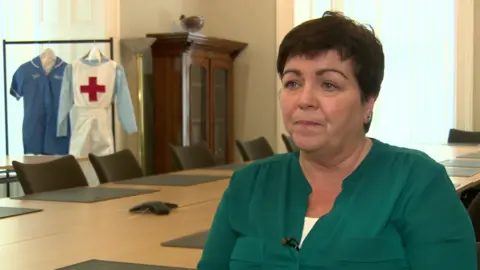Nursing Student’s Announcement Draws Union Criticism
Nursing Student’s Announcement Draws Union Criticism – The Royal College of Nursing (RCN) has criticized the recent announcement regarding nursing training placements in Northern Ireland, labeling it as “short-sighted and incomprehensible”.
The Department of Health has disclosed that this year’s allocation for health service education and training places will remain unchanged from the previous year.
In the academic year 2020-2021, nursing student placements saw a significant increase of 300, reaching a total of 1,325, a number that was maintained the following year. However, the number of placements was reduced to 1,025 last year.
Health Minister Robin Swann expressed his disappointment, citing budgetary constraints as the reason for the inability to increase placements as desired.
Rita Devlin, the executive director of RCN Northern Ireland, voiced concern over this regression, emphasizing the critical need for more nurses in response to escalating demand. She highlighted the historical trend of cuts in student nursing placements, resulting in persistent nursing vacancies.
Despite achieving an increase in placements in 2020, the region is now experiencing a decrease for the second consecutive year, contrary to professional advice suggesting a continued need for around 1,300 placements.
According to the Department of Health, the allocation for pre-registration education places will remain the same as last year for Nursing and Midwifery (1,025), Allied Health Professionals (335), and Social Work (285).
While acknowledging significant progress in bolstering the local workforce in recent years, the department expressed disappointment in not being able to increase placements this year to support the ongoing transformation of health and social care.

Robin Swann affirmed his commitment to advocating for increased funding for health and social care, expressing his intention to pursue Executive transformation funds and cross-departmental backing for investment in training.
Highlighting a 15.7% rise in whole time equivalent staff between March 2018 and December 2023, the minister emphasized the progress made in staffing levels.
YOU MAY LIKE: Insulin Resistance Diet
Rita Devlin reiterated the RCN’s longstanding warnings regarding the detrimental effects of reducing locally trained nurses on patient care.
She emphasized the overreliance on internationally educated nurses, who are less likely to remain in their positions long-term. Devlin pointed out the global shortage of nurses, exacerbating recruitment and retention challenges in Northern Ireland.
While acknowledging budgetary constraints, the RCN stressed the imprudence of deferring issues, particularly considering the long-term expenses associated with relying on foreign nurses and agency staff.

The Chartered Society of Physiotherapy has voiced concerns over the lack of increase in undergraduate training places, stating that it poses a significant threat to the sustainability of Northern Ireland’s healthcare workforce.
According to the society, this decision carries critical implications for the long-term workforce, including the potential departure of aspiring healthcare professionals seeking education opportunities elsewhere.
Claire Ronald, Senior Negotiating Officer for the Chartered Society of Physiotherapy, emphasized that the repercussions extend beyond education.
With fewer local students pursuing careers in essential healthcare disciplines, Northern Ireland is at risk of facing a shortage of qualified professionals.
This shortage is expected to profoundly impact healthcare services, affecting patient care, treatment accessibility, and overall system efficiency.
Source: bbcnews

A graduate of Computer Science and Information Management Technology. Diploma – Caregiving, Certificates – Dementia and Diabetes Awareness and Management. A researcher, blogger, songwriter, singer and acoustic guitarist. Born in an environment where natural talents such as healing are imparted at our natural birth. This natural talents of healing is the result of our genetic inheritance and the training from family environment.






